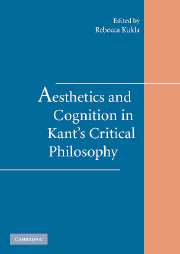Book contents
- Frontmatter
- Contents
- Notes on Contributors
- Acknowledgments
- 1 Introduction: Placing the Aesthetic in Kant's Critical Epistemology
- PART I SENSIBLE PARTICULARS AND DISCURSIVE JUDGMENT
- PART II THE COGNITIVE STRUCTURE OF AESTHETIC JUDGMENT
- 5 Dialogue: Paul Guyer and Henry Allison on Allison's Kant's Theory of Taste
- 6 Intensive Magnitudes and the Normativity of Taste
- 7 The Harmony of the Faculties Revisited
- 8 Kant's Leading Thread in the Analytic of the Beautiful
- PART III CREATIVITY, COMMUNITY, AND REFLECTIVE JUDGMENT
- Bibliography
- Index
5 - Dialogue: Paul Guyer and Henry Allison on Allison's Kant's Theory of Taste
Published online by Cambridge University Press: 24 July 2009
- Frontmatter
- Contents
- Notes on Contributors
- Acknowledgments
- 1 Introduction: Placing the Aesthetic in Kant's Critical Epistemology
- PART I SENSIBLE PARTICULARS AND DISCURSIVE JUDGMENT
- PART II THE COGNITIVE STRUCTURE OF AESTHETIC JUDGMENT
- 5 Dialogue: Paul Guyer and Henry Allison on Allison's Kant's Theory of Taste
- 6 Intensive Magnitudes and the Normativity of Taste
- 7 The Harmony of the Faculties Revisited
- 8 Kant's Leading Thread in the Analytic of the Beautiful
- PART III CREATIVITY, COMMUNITY, AND REFLECTIVE JUDGMENT
- Bibliography
- Index
Summary
REMARKS ON HENRY ALLISON'S KANT'S THEORY OF TASTE BY PAUL GUYER
In Kant's Theory of Taste: A Reading of the Critique of Aesthetic Judgment, Henry Allison has provided a detailed study of the two introductions and the first half of Kant's Critique of the Power of Judgment to stand alongside his previous volumes on Kant's theoretical and practical philosophy, his Kant's Transcendental Idealism of 1983 and Kant's Theory of Freedom of 1990. Allison is as deeply committed to the unity and coherence of Kant's thought as any contemporary interpreter of his philosophy, and it is a major aim of the present book to demonstrate the deep connections between the two halves of Kant's third Critique, that is, Kant's aesthetics and his teleology, as well as to demonstrate the profound connections between Kant's aesthetic theory and his theoretical philosophy on the one hand as well as his practical philosophy on the other.
I focus here on Allison's defense of Kant's general conception of reflective judgment and the principle of purposiveness, his defense of Kant's deduction of pure judgments of taste, and his interpretation of Kant's connection between aesthetics and morality. In the following section I recap those parts of Kant's Theory of Taste that take up these three topics, and in the section after that I discuss several points of difference between his views and mine in each case.
- Type
- Chapter
- Information
- Aesthetics and Cognition in Kant's Critical Philosophy , pp. 111 - 137Publisher: Cambridge University PressPrint publication year: 2006
- 20
- Cited by



